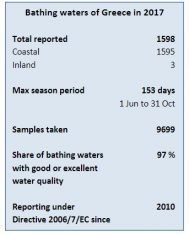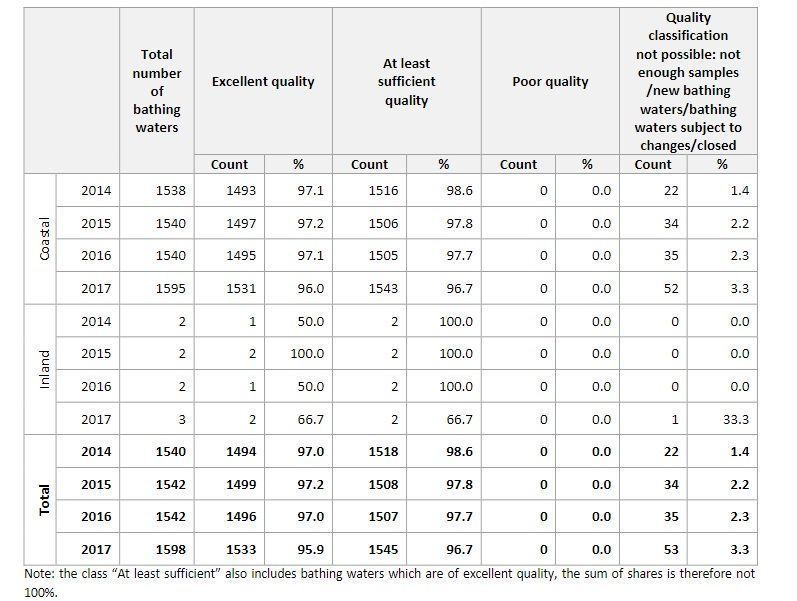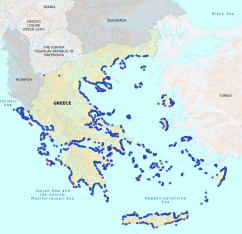Greece Among Top 5 European Countries with Excellent Bathing Water Quality
Greece is among the five European countries where 95 percent or more of bathing waters were assessed as being of “excellent” quality, according to the latest annual bathing water quality report published by the European Environment Agency (EEA) and the Commission.
This means that bathing waters in Greece are among those waters mostly free from pollutants.
Based on 2017 data, Greece ranks fourth, holding the same position as in 2016, with 95.9 percent of all 1,598 sites reported as being of excellent quality. Luxembourg ranks first (all 12 reported bathing waters), Malta second (98.9 percent of all sites), Cyprus third (97.3 percent of all sites) and Austria fifth (95.1 percent of all sites).
On Greece specifically, EEA’s bathing water report that focuses on the country (Greece 2017 bathing water report) makes reference to the “abnormal situation” reported from September 10 until October 31, 2017, at 11 bathing sites because of pollution due to an oil spill from a sinking tanker in the Saronic Gulf. It is noted that the beaches opened for swimming in April 2018, with the exception of Salamina’s Limnionas bay, Selinia and Themistokleous coast.
Results of bathing water quality in Greece from 2014 to 2017
Nearly all 21.801 bathing water sites monitored in Europe – of which 21.509 were in the 28 EU Member States – met the minimum quality requirements under EU rules according to the report.
“The quality of our bathing water is a source of pride for Europeans. That quality is due to good cooperation and constant vigilance,” said European Commissioner for the Environment, Maritime Affairs and Fisheries Karmenu Vella.
“Excellent” quality standards across Europe dropped marginally from 85.5 percent in 2016 to 85 percent last year. Similarly those meeting minimum “sufficient” standing fell from 96.3 percent to 96 percent. The reason for the slight drop was mostly due to the effect of summer rain on test results as well as changes in testing methodology in Romania and Sweden.
The number of overall “poor” rated sites remained mostly unchanged from 2016 across the EU, Albania and Switzerland, dropping from 1.5 percent in 2016 to 1.4 percent in 2017.
Alongside this year’s report, the EEA has also released an updated interactive map showing the performance of each bathing site.









How often is bathing water analised? I was under the impression that BLUE Flag Beaches require continuous monitoring. What is the frequency of monitoring?
There are some extreme air and water quality issues from diesel pollutants by Greek ferries. Greek ferries should be required to spend nights offshore and pass stringent emissions requirements. My home in Poros is subjected to diesel pollution whilst the ferries remain in port over night.
If we want to preserve our great European bathing waters, preservation steps need to be taken as soon as possible. Ferry owners are interested in profits and should be considering the environment with greater urgency.
Geraldo Marcovich